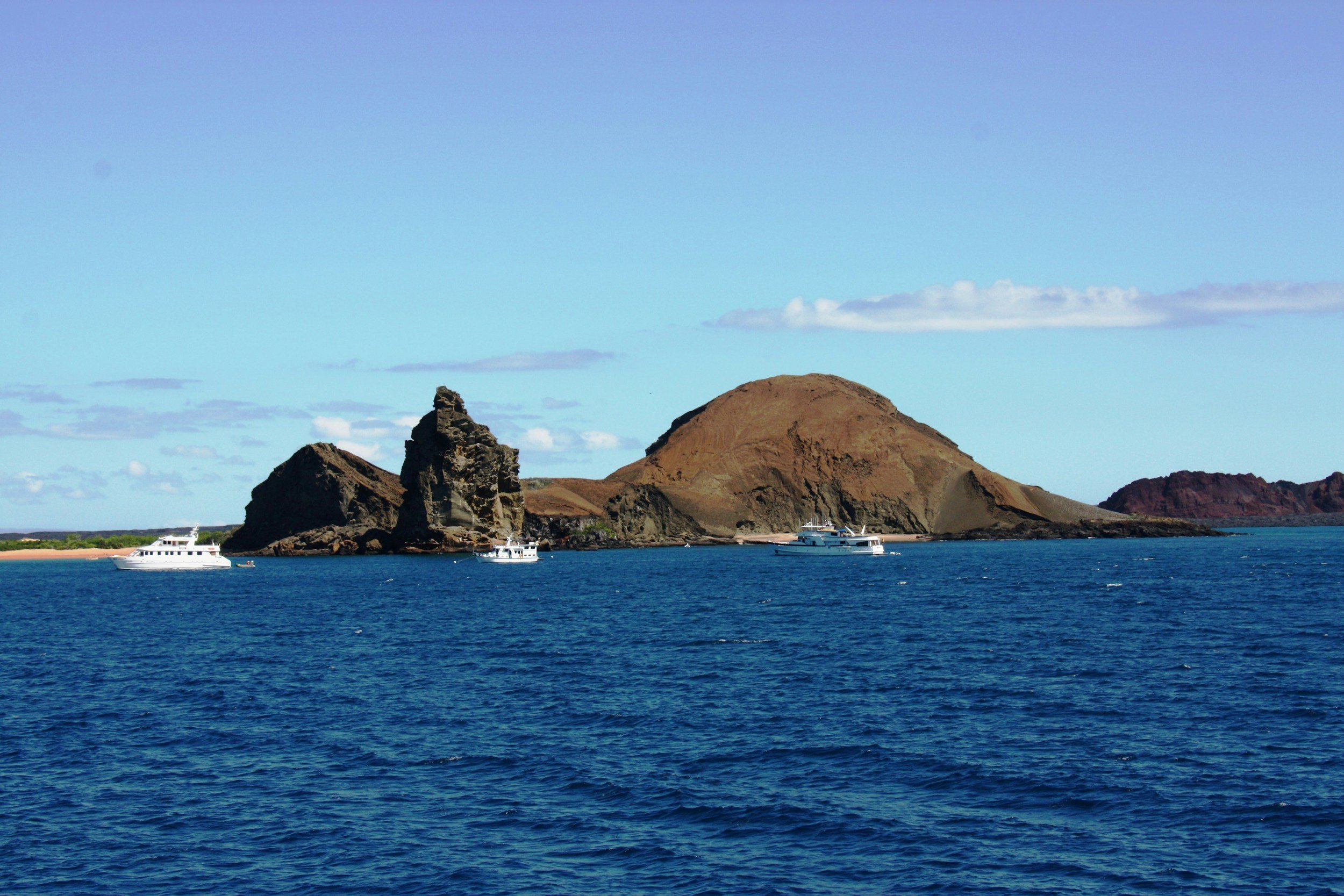
Quito and the Galapagos
Read the day-by-day itinerary below for inspiration and ideas to create your own faculty-led program.







Day-by-Day Details
Day 1 - Quito
Board your flight from the US to Quito, Ecuador. Meet your local Travel Director at the airport and transfer to your centrally located hotel. Start exploring the city on an orientation walk before your group welcome dinner.
Day 2 - Quito
Enjoy a guided tour of Quito, which was founded in 1534 and became the first city in the world to be declared by UNESCO in 1978 as a World Cultural Heritage site. Quito’s Historical Center is the largest and best preserved in Latin America, it was built over the ruins of the Inca’s northern imperial seat. The style is an example of colonial architecture and art blended with indigenous styles. You’ll see iconic places such as the Plaza Grande, The Archbishop’s Palace, The Metropolitan Cathedral, and the Government Palace. You’ll also have the opportunity to take in a panoramic view of the city from El Panecillo Hill, and visit San Francisco Church & Basilica del Voto Naciona. After lunch, go to our planet's Latitude 0 ́0 ́0 to visit the original Equatorial monument. Then visit the Intiñan museum known as “The trek of Sun” where you will be guided through the wonderful world of the Andean Cosmo vision. This is the place where you can stand with one foot on the northern hemisphere and the other one on the southern hemisphere...a unique experience!
Day 3 - Quito
Today, you will travel to Mindo, which is considered one of the world’s top-five biodiverse hotspots. Visit the Tulipe Archaeological Site, home to the Yumbos culture. The Yumbo people lived in the surrounding area of Quito between 800 and 1660 AD. The Insitu Museum shows the remains of significant archeological vestiges left behind by the Yumbos, believed to have moved to the Amazon after the Pichincha volcano erupted in 1660. Tulipe seems to have been used as the tribe’s main ceremonial site. It features various stone structures in a shape of pools, which in ancient times were filled with water so that shamans could observe the stars. Several interesting petroglyphs (finite spirals and circles within circles carved in stone) have been found in stones located in the rivers close to the Ceremonial Center.
Later, visit a cacao artisan factory and learn about the different stages of the process to elaborate chocolate, from fermentation, roasting of the cocoa beans to “cocoa nibs” and finally the chocolate bar.
A stop will be made to see humingbirds, as well as the orchids, considered the oldest plants in the world in their natural habitat. Ecuador is home to approximately 132 species of hummingbirds and approximately 4250 species of orchids out of which close to 1300 are endemic. .
Day 4 - Puerto Baquerizo
This morning, fly to San Cristobal Airport and transfer to hotel for check-in. After lunch, take out kayaks to explore the marine life in the Galapagos around the San Cristobal Beach at Tijeretas Bay. Kayaking allows you to navigate the waters swiftly and easily, where you might see manta rays and sea turtles. You’ll also see plenty of sea lions along the beach!
Day 5 - Puetro Baquerizo
Today, take an excursion to Española Island, which is the southernmost island of the Archipelago, and due to its geographical isolation, has a high index of endemic species, unique to this island in particular. Visit Punta Suárez where colonies of sea lions are found playing between the waves or resting on the small sandy beaches. Take a short walk inland to see colonies of marine iguanas, one of the most colorful species, endemic exclusively to this island, as well as colonies of blue-footed boobies and their slightly larger cousins, the white boobies of Nazca. Later, take a swim and snorkel at Gardner Bay. The wide bay is surrounded by a long coral sand beach of intense white color, i’s an iidyllic landscape and a perfect place to swim, and observe some of the terrestrial fauna around the beach. You may even have a family of sea lions join you on the beach!
Day 6 - Puerto Ayora
This morning, visit the Galapaguera Breeding Center, this center was built to increase and protect the population of tortoises on this island. Later, continue to El Junco Lagoon - located inside the small crater of an extinct small volcano. Frigate birds are often seen here washing the salt from their feathers, as well as white-cheeked pintails and common gallinules. Next, visit La Lobería and El Barranco to see the Galapagos sea lions that are on the beach and in the bay, and the large numbers of sea turtles along the rocky reefs of the bay. After lunch, take a boat to Santa Cruz Island, and have dinner in Puerto Ayora.
Day 7 - Puerto Villamil
Enjoy a free day today to explore, and later in the afternoon, take a boat to Isabela Island. Transfer to your hotel, and have dinner.
Day 8 - Puerto Villamil
Take an excursion to the Sierra Negra Volcano. This volcano has the second largest volcanic crater in the world, measuring 6 miles in diameter and 300 feet deep. You’ll travel by bus for 45 minutes to the Galapagos National Park where you will register your visit and begin your hike to the Sierra Negra Volcano. You will then visit to the Volcán Chico where you can feel the warmth of the ground as proof the volcano’s activity! Later this afternoon, snorkel at “Concha Perla”, where you can swim and snorkel alongside tropical fish, sea lions, penguins and turtles.
Day 9 - Puerto Villamil
Take a boat ride to Los Túneles, natural underwater arches and tunnel formations that merge from the pristine blue waters. You will explore the brilliant scenery and enjoy snorkeling. You will get the chance to see the white-tipped shark, manta rays, parrotfish, yellowtail surgeonfish, seahorses, and green sea turtles. Later, take a bike tour of the city of Puerto Villamil, accompanied by a bilingual naturalist guide. The tour includes a visit to young lava fields, a flamingo lagoon, a visit to the turtle breeding center, a journey to the south parallel to the great beach of Puerto Villamil, a wetland system made up of La Playita, Playa del Amor, different lagoons, estuary tunnel, orchilla hill and finally the Wall of Tears with its spectacular viewpoint called El Radar, where a North American military base was installed.
Day 10 - Puerto Ayora
This morning, take a boat to Santa Cruz Island, upon arrival at Puerto Ayora – Santa Cruz Island, transfer to your hotel. Later, visit an Ecological Reserve to learn about the giant tortoises in their natural state. Then drive to Puerto Ayora to visit the Tortoise Breeding Center, former Charles Darwin Station. It is a scientific research center on the evolution of species. This is home of land turtles of the different species that inhabit the islands. After lunch, take a walk along a trail to Tortuga Bay beach, a beautiful white sand beach- a preferred a nesting site for the black turtle. The bay is divided into two inlets with 2 beaches, the first called Playa Brava and the second called Playa Mansa. Playa Brava is not open to swimmers and it is preserved for the local wildlife: marine iguanas, crabs and many species of birds. Playa Mansa is a great place for swimming and snorkeling.
Day 11 - Puerto Ayora
This morning, leave by boat to take a tour of the Academia Bay of Santa Cruz, visiting exotic and unique places, such as La Lobería, a small islet to swim and do snorkeling with sea lions, The Canal del Amor, a viewpoint where turquoise water and geological formations form a natural pool, La Playa de los Perros, where we will observe a large number of dog crabs, and a colony of marine iguanas, then to the Canal de los Tiburones to observe ravine sharks, and finally to Las Grietas, where we will enjoy a walk along a natural path of lava rocks observing before doing some more snorkeling.
Day 12 - Quito
Transfer from your hotel to the Baltra Island airport to take your flight back to mainland Ecuador. Upon arrival, transfer to your hotel and join your group for your farewell dinner!
Day 13 - Departure Day
Transfer to Quito airport for your return trip home.
